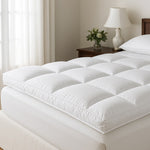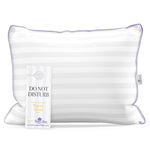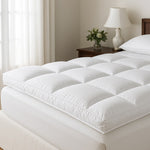You have no items in your shopping cart.
I've been binging on so many excellent podcasts, and digging into all things sleep. Even more than usual. Of course it's easy to assume that better sleep leads to better health and a better life, but it's great to learn the medical science of it too.
Some of it's this + that equals this other thing, and a lot of it's common sense, but here's the super high level of what I've learned on a super deep topic. Of course this is just informational and not meant as actual medical advice.
Your brain's active at night.
Normal - and needed - brain function happens at night. If not, why would we sleep?
Your brain's active at night, helping to repair muscles and organs, managing metabolism, and releasing hormones. Your brain clears out nervous system "waste" built up throughout the day at night.
Perhaps chief among that is the clearing away of a toxic protein tied to Alzheimer's. That's not meant to say that a single night of broken sleep will lead to Alzheimer's, but a pattern of poor sleep creates an abundance of a protein associated with Alzheimer's.
There's few physiological processes that don't benefit from sleep.
Sleep adds to memory function, nighttime brain activity regulates emotion, and growth hormone's released at night.
If your sleeping's negatively impacted, all of that brain function is negatively impacted too.
Poor sleep's linked to heart disease and obesity.
A study published in the Journal of the American Heart Association linked sleep deprivation to heart attack and stroke.
High blood pressure and diabetes patients, two risk factors for heart attack and stroke, are more than twice as likely to die from those medical events when sleeping less than six hours per night.
Too little sleep increases stress.
This one's admittedly on the looser end of science, and a little stretch could see lots of similar scenarios too.
Our lives are busier than ever, unfortunately, and better sleep's more invaluable than decades earlier because of it.
Greater stress increases the risk of a car accident and the potential for similar other negative impacts. That might sound silly, but it's hard to argue against that common sense thought.
Too little sleep suppresses our immune system, and of course that's increasingly significant too.
__
That's all just to reiterate the importance of better sleep. Can a Queen Anne pillow - the right Queen Anne pillow - help with better sleep? Absolutely.

I've been binging on so many excellent podcasts, and digging into all things sleep. Even more than usual. Of course it's easy to assume that better sleep leads to better health and a better life, but it's great to learn the medical science of it too.
Some of it's this + that equals this other thing, and a lot of it's common sense, but here's the super high level of what I've learned on a super deep topic. Of course this is just informational and not meant as actual medical advice.
Your brain's active at night.
Normal - and needed - brain function happens at night. If not, why would we sleep?
Your brain's active at night, helping to repair muscles and organs, managing metabolism, and releasing hormones. Your brain clears out nervous system "waste" built up throughout the day at night.
Perhaps chief among that is the clearing away of a toxic protein tied to Alzheimer's. That's not meant to say that a single night of broken sleep will lead to Alzheimer's, but a pattern of poor sleep creates an abundance of a protein associated with Alzheimer's.
There's few physiological processes that don't benefit from sleep.
Sleep adds to memory function, nighttime brain activity regulates emotion, and growth hormone's released at night.
If your sleeping's negatively impacted, all of that brain function is negatively impacted too.
Poor sleep's linked to heart disease and obesity.
A study published in the Journal of the American Heart Association linked sleep deprivation to heart attack and stroke.
High blood pressure and diabetes patients, two risk factors for heart attack and stroke, are more than twice as likely to die from those medical events when sleeping less than six hours per night.
Too little sleep increases stress.
This one's admittedly on the looser end of science, and a little stretch could see lots of similar scenarios too.
Our lives are busier than ever, unfortunately, and better sleep's more invaluable than decades earlier because of it.
Greater stress increases the risk of a car accident and the potential for similar other negative impacts. That might sound silly, but it's hard to argue against that common sense thought.
Too little sleep suppresses our immune system, and of course that's increasingly significant too.
__
That's all just to reiterate the importance of better sleep. Can a Queen Anne pillow - the right Queen Anne pillow - help with better sleep? Absolutely.









